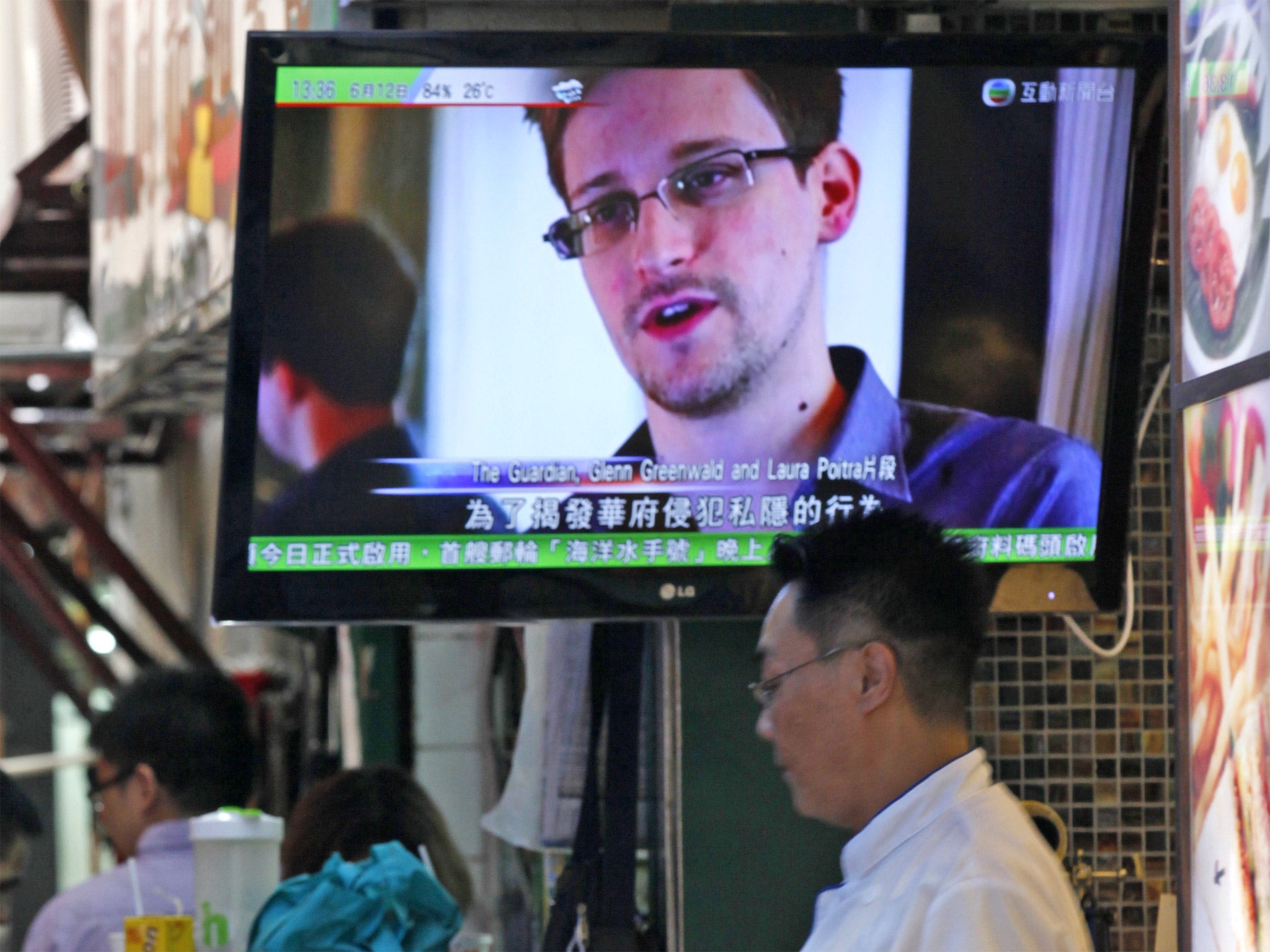NSA Prism whistleblower: State-run newspaper says Edward Snowden hiding in Hong Kong threatens US-China relations
Snowden: 'I am not here to hide from justice, I am here to reveal criminality'

Your support helps us to tell the story
From reproductive rights to climate change to Big Tech, The Independent is on the ground when the story is developing. Whether it's investigating the financials of Elon Musk's pro-Trump PAC or producing our latest documentary, 'The A Word', which shines a light on the American women fighting for reproductive rights, we know how important it is to parse out the facts from the messaging.
At such a critical moment in US history, we need reporters on the ground. Your donation allows us to keep sending journalists to speak to both sides of the story.
The Independent is trusted by Americans across the entire political spectrum. And unlike many other quality news outlets, we choose not to lock Americans out of our reporting and analysis with paywalls. We believe quality journalism should be available to everyone, paid for by those who can afford it.
Your support makes all the difference.The NSA whistleblower's evasion of US justice in Hong Kong poses a threat to Sino-American relations, according to a major Chinese newspaper.
Edward Snowden went to ground on Monday. He had fled to China's special autonomous region as controversy raged over the details he leaked to a newspaper about US government surveillance.
The revelations, published in The Guardian, were about the National Security Agency's Prism programme, which collects people's communication records in bulk.
On the the first business day after a three-day national holiday, the state-run English-language China Daily wrote that the revelations were "certain to stain Washington's overseas image and test developing Sino-US ties."
"How the case is handled could pose a challenge to the burgeoning goodwill between Beijing and Washington given that Snowden is in Chinese territory and the Sino-US relationship is constantly soured on cybersecurity," it continued.
Li Haidong, a researcher in American studies at China Foreign Affairs University, told the newspaper: "For months, Washington has been accusing China of cyberespionage, but it turns out that the biggest threat to the pursuit of individual freedom and privacy in the US is the unbridled power of the government."
The US Department of Justice is now planning criminal and extradition proceedings, but has filed no charges. Regina Ip, a pro-Beijing legislator and previously the city’s top security official, said: "I can't speak for the Hong Kong government now, but if the US gives a request, the government will deal with it in accordance with due process."
The city of seven million people is ultimately answerable to Beijing but maintains an independent judiciary and media.
Beijing itself has no extradition agreement with Washington, and Article 3 of the US-Hong Kong treaty allows the city to refuse extradition if it believes that it might impact on China’s “defence, foreign affairs or essential public interest or policy”.
Hong Kong can also refuse extradition if either it or China believes the request is politically motivated, and that the person would be prosecuted for his or her political views.
In an interview yesterday, Snowden told the Hong Kong-based South China Morning Post (SCMP): "I am not here to hide from justice, I am here to reveal criminality." He also dangled the possibility of more revelations, particularly evidence that the US has been hacking systems in China and Hong Kong.
He said he will stay in the city “until I am asked to leave”, adding: “I have had many opportunities to flee HK, but I would rather stay and fight the US government in the courts, because I have faith in HK’s rule of law.”
Snowden said the NSA had hundreds of cyberespionage targets in mainland China and Hong Kong. "We hack network backbones – like huge internet routers, basically – that give us access to the communications of hundreds of thousands of computers without having to hack every single one," he said.
Today Chow Chung Yan, news editor of the SCMP, said the 29-year-old was still in the city. He declined to give details about the interview other than to say it took place on Wednesday in a secure location.
Cyberespionage has been a bone of contention between the world's two biggest economies, whose leaders met earlier this week. After the two-day meeting between President Barack Obama and his new Chinese counterpart Xi Jinping, the best that US national security adviser Tom Donilon could boast was that "the Chinese senior leadership understand clearly the importance of this issue to the United States."
Back in America, the NSA director, Army General Keith Alexander, will address the Senate Intelligence Committee in closed session later today.
"I do think it's important that we get this right, and I want the American people to know that we're trying to be transparent here, protect civil liberties and privacy but also the security of this country," he told a Senate panel.
Gen Alexander defended the agency's surveillance programmes, saying they led to "disrupting or contributing to the disruption of terrorist attacks" but did not give details. He warned that revelations about the secret programmes have eroded agency capabilities and, as a result, the US and its allies will not be as safe as they were two weeks ago.
"Some of these are still going to be classified and should be, because if we tell the terrorists every way that we're going to track them, they will get through and Americans will die," he said.
Subscribe to Independent Premium to bookmark this article
Want to bookmark your favourite articles and stories to read or reference later? Start your Independent Premium subscription today.
Join our commenting forum
Join thought-provoking conversations, follow other Independent readers and see their replies
Comments